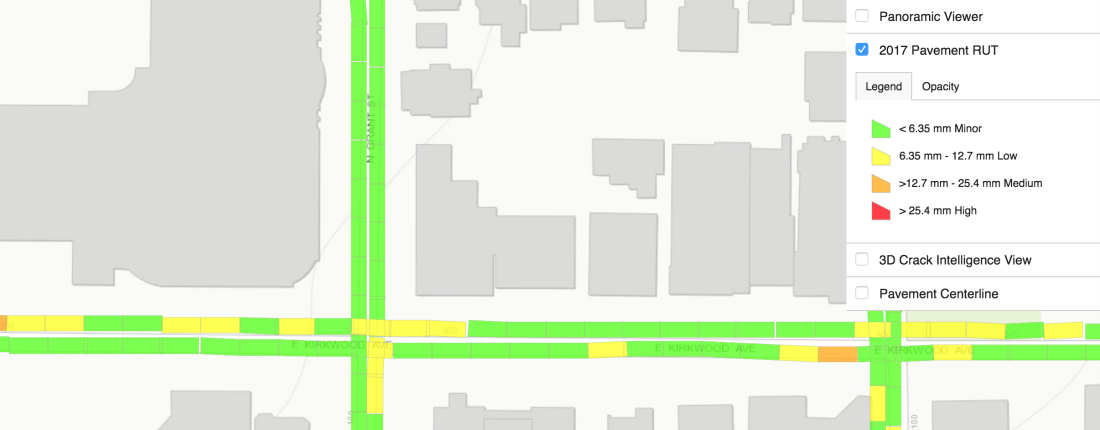Bloomington paves way for Little 500 street sprints

On Saturday afternoon in downtown Bloomington, a blocked-off Kirkwood Avenue offered enough car-free asphalt for the Indiana University Student Foundation to run 54 heats of cyclists down a 200-meter course.
Kaethe Schroeder (SKI) and Robert Strobel (Black Key Bulls) prevailed in the finals of the women’s and men’s divisions, respectively. The Street Sprints are part of the fall cycling series tied to the Little 500 bicycle race held in the spring.
The first rounds of the Street Sprints included 24 heats, which winnowed the men and women’s fields from 167 total cyclists down to 32—16 men and 16 women. The remaining rounds were two-up sprints—only the winner advanced.
According to race director Andrea Balzano, this fall marked the ninth year of Street Sprints. For the first two years the event was held on North Jordan Avenue, but since 2013, it’s been held on Kirkwood.
Kirkwood, of course, is an avenue that’s storied not just in song (“Tonight, I’m gonna see my baby again, we’re gonna go walkin’ down Kirkwood, look at us go”) but in Bloomington’s public works budget presentations this year (“Pavement maintenance project for East Kirkwood Avenue…Delayed due to high contracting costs”).
Kirkwood Avenue came up during the August budget hearings for two different departments—transportation and planning, and public works. The transportation and planning department has $125,000 in the proposed 2020 budget for design work on the street. That will include a charrette to gather input and ideas on redesigning Kirkwood, from Indiana to Walnut, as a shared street with a focus on pedestrians.
When the public works budget was presented by the department’s director, Adam Wason, he told the city council that Kirkwood was due for pavement maintenance—from North Walnut Street to North Indiana Avenue that included resurfacing 1.75 street lane miles of road. It was supposed to be done by August 31 of this year. The project was delayed due to high contracting costs, Wason told the council.
In a little more detail, Wason said $350,000 was set aside in the 2019 budget for the Kirkwood project. After everything was engineered and some safety features were added, the engineer’s estimate for the work rose to $500,000. At that point, Wason said, he was thinking it still might be possible to cobble together enough funds to get the project done in 2019.
But when it was put out to bid, it was a little bit late into the bid season, Wason said, and a several of the contractors already had their work lined up. Only one bid was received, and it was around 40 percent higher than the engineers estimate. So that bid wasn’t accepted.
Wason told the council that Bloomington has applied for a Community Crossings grant from the Indiana Department of Transportation to help offset some of those costs. In late August, Wason told the council he hoped to hear about a possible grant within 30 to 60 days. On Friday last week, Wason said there was not yet any news to report on that.
The city bases its street pavement, sidewalk, curb, and street sign maintenance schedule on an inventory that was done by a contractor through a combination of LIDAR (Light Imaging Detection and Ranging) and driving the streets. Here’s a screenshot of Kirkwood’s pavement conditions from the public online interface:

To allow the Street Sprints event to take place, the city’s board of public works had to grant some key approvals, including the street closure. The board’s approval included a waiver of the city’s noise ordinance, so that amplified music could be played and a PA could be used.
Responding to a query from The Beacon, public works office staff said that IU Student Foundation, as a nonprofit, was not required to pay the parking space reservation fee. It’s normally $20 per space plus a $10 administrative fee.
According to the resolution approved by the board of public works, IUSF was required to pay for off-duty Bloomington police officers or IU police officers to provide traffic control and the security measures, like street barricades.
The staff report and recommendation was prepared by Sean Starowitz, who’s assistant director for the arts for the city’s department of economic and sustainable development. Responding to a question from The Beacon, Starowitz said he handles all street closures that involve the broader definition of “culture.”




Comments ()